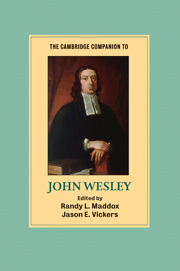Book contents
- Frontmatter
- Introduction
- Part I Wesley’s context
- Part II Wesley’s life
- Part III Wesley’s work
- 4 Wesley as revivalist/renewal leader
- 5 Wesley as preacher
- 6 Wesley as biblical interpreter
- 7 John Wesley as diarist and correspondent
- 8 John Wesley as editor and publisher
- 9 Wesley’s engagement with the natural sciences
- 10 Wesley as adviser on health and healing
- 11 Wesley’s theological emphases
- 12 Happiness, holiness, and the moral life in John Wesley
- 13 Wesley’s emphases on worship and the means of grace
- Part IV Wesley’s legacy
- Select bibliography
- Index
12 - Happiness, holiness, and the moral life in John Wesley
from Part III - Wesley’s work
Published online by Cambridge University Press: 28 September 2010
- Frontmatter
- Introduction
- Part I Wesley’s context
- Part II Wesley’s life
- Part III Wesley’s work
- 4 Wesley as revivalist/renewal leader
- 5 Wesley as preacher
- 6 Wesley as biblical interpreter
- 7 John Wesley as diarist and correspondent
- 8 John Wesley as editor and publisher
- 9 Wesley’s engagement with the natural sciences
- 10 Wesley as adviser on health and healing
- 11 Wesley’s theological emphases
- 12 Happiness, holiness, and the moral life in John Wesley
- 13 Wesley’s emphases on worship and the means of grace
- Part IV Wesley’s legacy
- Select bibliography
- Index
Summary
The elderly John Wesley, just a few months shy of his eighty-sixth birthday, asked a crowd of Irish Methodists gathered in Dublin a classic question from an unlikely source - the Calvinist Westminster Confession: “For what end did God create man?” One simple answer, Wesley insisted, should be “inculcated upon every human creature: 'You are made to be happy in God.'” Wesley then tendered advice to parents. Even when a child first begins to speak or to run alone, a good parent follows behind saying, many times each day, “He made you; and he made you to be happy in him; and nothing else can make you happy.” What is the happiness for which humans were made? Wesley insisted that just “as there is one God, so there is one religion and one happiness.” This one human happiness and true religion is the love of God and the love of neighbor. It is, “in two words, gratitude and benevolence; gratitude to our Creator and supreme Benefactor, and benevolence to our fellow creatures.” The active benevolence toward others that is born of our gratitude to God is for Christians the wellspring of the moral life and of human happiness. Happiness is impossible without this grateful love of God and benevolent, active love toward others. And the moral life is one with this happiness.
- Type
- Chapter
- Information
- The Cambridge Companion to John Wesley , pp. 207 - 224Publisher: Cambridge University PressPrint publication year: 2009



